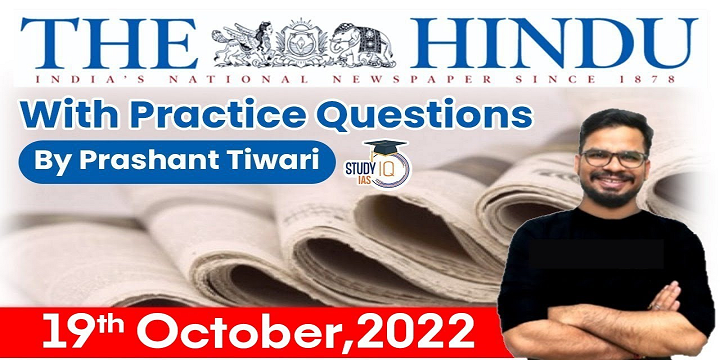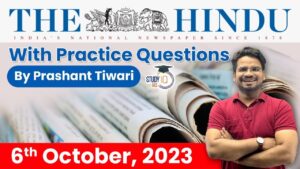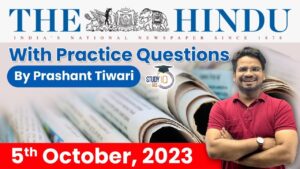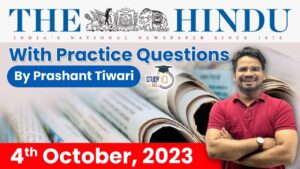The Hindu Newspaper Analysis for UPSC

The Hindu Newspaper Analysis 18 October 2022
- When threats are global, the response cannot be just local. Each nation is working on strategies against them. But what we do within our borders is no longer enough, PM says at Interpol meet.
- “When threats are global, the response cannot be just local. It is high time that the world came together to defeat these threats,” Mr. Modi said at the inaugural address at the four-day 90th Interpol General Assembly meet.
- It was set up in 1923, as a secure information-sharing platform that facilitates criminal investigation of police forces across the globe through collection and dissemination of information received from various police forces.
- It is headquartered in Lyon, France.
The mandate of Interpol:
- Interpol is like the UN. But it is not meant for dispute resolution. It is designed to assist the police forces of member nations. Interpol is neither an investigative agency like the CBI nor a front-line police force. It is mandated to share information and provide back-end technical assistance to law enforcement agencies
- Interpol deals with cases of Child abusers, Rapists, Murderers, Traffickers, Drug dealers, and Cybercriminals
- Providing information: about crime and criminals in the digital space
- Cyberspace: Preventing abuse of cyberspace
- Dark web: Stalling hackers on the dark web

- The Tamil Nadu Legislative Assembly on Tuesday adopted a resolution urging the Centre not to implement the recommendations made in the report of the Parliamentary Committee on Official Language submitted by its chairman to the President of India.
- The parliamentary panel has recommended Hindi as the medium of instruction in Central institutions of higher education in Hindi-speaking States and regional languages in other States.
- The eighth schedule includes the recognition of the following 22 languages:
- Assamese, Bengali, Gujarati, Hindi, Kannada, Kashmiri, Konkani, Malayalam, Manipuri, Marathi, Nepali, Odia, Punjabi, Sanskrit, Sindhi, Tamil, Telugu, Urdu, Bodo, Santhali, Maithili and Dogri are the 22 languages presently in the eighth schedule to the Constitution.
- Of these languages, 14 were initially included in the Constitution. Subsequently, Sindhi was added in 1967; Konkani, Manipuri and Nepali were added in 1992; and Bodo, Dogri, Maithili and Santali were added by the 92nd Amendment Act of 2003.
- Assamese, Bengali, Gujarati, Hindi, Kannada, Kashmiri, Konkani, Malayalam, Manipuri, Marathi, Nepali, Odia, Punjabi, Sanskrit, Sindhi, Tamil, Telugu, Urdu, Bodo, Santhali, Maithili and Dogri are the 22 languages presently in the eighth schedule to the Constitution.

- The Capital’s air quality index (AQI) deteriorated slightly and continued to be in the “poor” category on Tuesday, according to the Central Pollution Control Board (CPCB) data.
What is the National Air Quality Index?
Launched in 2014 with outline ‘One Number – One Color -One Description’ for the common man to judge the air quality within his vicinity.
- The measurement of air quality is based on eight pollutants, namely: Particulate Matter (PM10), Particulate Matter (PM2.5), Nitrogen Dioxide (NO2), Sulphur Dioxide (SO2), Carbon Monoxide (CO), Ozone (O3), Ammonia (NH3), and Lead (Pb).
- AQI has six categories of air quality. These are: Good, Satisfactory, Moderately Polluted, Poor, Very Poor and Severe.
- The bio-decomposer solution is one of the 15 focus points in the Delhi government’s winter action plan, which was released last month.
- In the last two years, a bio-decomposer capsule, developed by the Indian Agricultural Research Institute, was turned into a solution through a week-long process, after which it decomposes straw and stubble into manure.
- “This year, the Pusa institute has provided the bio-decomposer in liquid form to the Delhi government. The government has procured the liquid bio-decomposer directly from the institute and is spraying the bio-decomposer under its supervision.
- This time, the institute has also prepared a bio-decomposer in powder form and the government has decided to use it on 1,000 acres of agricultural fields on a trial basis,” Mr. Rai said.

- For every child who lost its mother, three children lost their father to the COVID-19 pandemic in Maharashtra.
- ‘Vulnerable Children of Maharashtra’, a report on the status of children orphaned by COVID-19 by Vidhi Maharashtra, an independent think tank, found that 22,760 children lost their fathers while 2,678 lost their mothers to COVID-19.
- A greater proportion of children losing their father may indicate that many families may suffer from financial instability post-pandemic.

- The Embassy of Japan, New Delhi, has filed an application seeking Geographical Indication (GI) tag for nihonshu/Japanese sake, an alcoholic beverage.
- It is learnt that this is the first time a product from Japan has filed for a tag at the Geographical Indication Registry in Chennai.
- According to details provided in the filing, in Japan, nihonshu is regarded as a special and valuable beverage made from fermenting rice.
- People traditionally drink nihonshu on special occasions, such as festivals, weddings or funerals, but it is also consumed on a daily basis.
- For making nihonshu three main raw materials – rice, koji-kin (a type of fungal spore) and water – are required.
- The Embassy of Japan, in the filing, also mentioned that in the past, the economy of Japan was based around rice, which was used as a sort of quasi-money before the establishment of a monetary economy in the Meiji period (1869-1912).
- Toii system (Toii is the person responsible for sake brewing).

- The new species of spiders were found from the Garo hills in Meghalaya, the Thar desert of Rajasthan, Wayanad Wildlife Sanctuary, Kottappara hills near Kothamangalam, Thumboormuzhi butterfly garden near Athirappilly, and the University of Calicut campus.
- Garo hills of Meghalaya resulted in the first spotting of the genus Siamspinops from India with a new species Siamspinops garoensis.
- This belongs to the family of flat spiders, Selenopidae. This spider lives in the crevices of rocks on hills. The yellowish brown spider measures about 10 mm in length. There is a black circle around its eyes and black patches on the abdomen,” Dr. Sudhikumar said.
- Two new species of spiders coming under the family of jumping spiders (Salticidae) were discovered from the Thar desert of Rajasthan and the Kurichiyad forest ranges of the Wayanad Wildlife Sanctuary.
- Afraflacilla miajlarensis, the Thar species, is characterised by white fine hairs on a black head and black horizontal lines on the abdomen. This spider stays among dry leaf blades. Afraflacilla kurichiadensis, the Wayanad species, is characterised by red patches around the eyes and white hairs on the abdomen.
- The next spider species lacks a venom gland and belongs to the family of feather- legged spiders (Uloboridae). This new species has been named as Philoponella rostralis, due to the presence of a beak like structure on the male reproductive organ.
- Two new species of spiders belonging to the family of spiny-legged spiders (Oxyopidae) have been discovered from the Thumboormuzhi butterfly garden, near the Athirappilly waterfalls, and on the Calicut University campus.

- Yet, with just a day before the 60th observance of a dark moment in the history of our young nation, the 1962 India-China war (it began on October 20), there is no indication of its observance in which India lost so many of its brave men — (as in one report) 1,383 soldiers killed, 1,047 wounded, 1,696 missing and over 400 prisoners of war with the Chinese.
- Second, an underestimation of the strength of the Indian Air Force (IAF) resulted in its offensive fleet not being used; all writings indicate that the use of fighter aircraft would have been a game changer especially since the Chinese air force was severely operationally handicapped due the high altitude of the airfields from which its aircraft would have had to operate.

- Article 164 of the Constitution, which says the Chief Minister shall be appointed by the Governor and other Ministers shall be appointed by the Governor on the Chief Minister’s advice, adds that “the Ministers shall hold office during the pleasure of the Governor”.
- It is also now judicially determined that the question of majority can be answered only on the floor of the legislature through a confidence vote. Nothing in the Article means that the Governor may independently dismiss a Minister.
- In other words, the term ‘pleasure of the Governor’ is used as a euphemism to refer to the Chief Minister’s power to drop a Minister from the Council of Ministers.


- Citizens belonging to different religions and denominations follow different property and matrimonial laws which is an “affront to the nation’s unity”, the government said in the Supreme Court.
- Article 44 (Uniform Civil Code) divests religion from social relations and personal law, it maintained.
- Background: The source of the concept of Directive Principles of State Policy (DPSP) is the Spanish Constitution from which it came in the Irish Constitution.
- The concept of DPSP emerged from Article 45 of the Irish Constitution.
- Constitutional Provisions: Part IV of the Constitution of India (Article 36–51) contains the Directive Principles of State Policy (DPSP).

- The Indo-Russian joint venture “Indo-Russian Rifles Private Ltd (IRRPL)” will be manufacturing over 6.1 lakh AK-203 assault rifles costing over ₹5,000 crore in Amethi, Uttar Pradesh.
- Training of Indian workers of the factory will begin shortly and the manufacturing process will reach 100% indigenisation in three years.
- The AK-203 assault rifles will replace the India-made INSAS assault rifles and the older AK-47.

- To bolster investments in solar power projects, the International Solar Alliance (ISA), in its General Assembly meeting here on Tuesday, approved the ‘Solar Facility’, a payment guarantee mechanism expected to stimulate investments into solar projects through two financial components — a Solar Payment Guarantee Fund and Solar Insurance Fund.
International Solar Alliance (ISA):
- The ISA was conceived as a joint effort by India and France to mobilise efforts against climate change through the deployment of solar energy solutions.
- It was presented by the leaders of the two countries at the 21st Conference of Parties (COP21) to the United Nations Framework Convention on Climate Change (UNFCCC) held in Paris in 2015.
- ISA is a coalition of solar resource rich countries lying fully or partially between the Tropic of Cancer and the Tropic of Capricorn to specifically address energy needs by harnessing solar energy.
- The Paris Declaration establishes ISA as an alliance dedicated to the promotion of solar energy among its member countries.
- ISA brings together countries with rich solar potential to aggregate global demand, thereby reducing prices through bulk purchase.
- It facilitates the deployment of existing solar technologies at scale, and promotes collaborative solar R&D and capacity building.
- Headquarters:
- The Headquarters is in India with its Interim Secretariat being set up in Gurugram.
- Member Nations:
- A total of 106 countries have signed the ISA Framework Agreement.
- Out of 106 nations, 86 have signed and ratified the ISA Framework Agreement.
- All member states of the United Nations are eligible to join the ISA.

- About 150 years ago, British colonialists brought batches of what they thought were a single species of the northern giraffe to India, from their other colonial possessions in Africa. These now comprise a captive population of 29 northern giraffes across the country.
- A recent genealogical study of the largest captive herd in India at the Alipore Zoological Garden in Kolkata has confirmed that the giraffes in this facility, at least, are most likely “critically endangered” Nubian giraffes (Giraffa camelopardalis camelopardalis) or the endangered Rothschild giraffe (Giraffa camelopardalis rothschildi).

About Financial Action Task Force (FATF)
- The FATF is an international watchdog for financial crimes such as money laundering and terror financing.
- Established: It was established at the G7 Summit of 1989 in Paris.
- Aim: To address loopholes in the global financial system after member countries raised concerns about growing money laundering activities.
- The FATF currently has 39 members. India is a member country.
- The decision-making body of the FATF, known as its plenary, meets thrice a year.
- Its meetings are attended by 206 countries of the global network, including members, and observer organisations, such as the World Bank, some offices of the United Nations, and regional development banks.
- The grey countries are designated as “jurisdictions under increased monitoring”, working with the FATF to counter criminal financial activities.
- Currently, 23 countries including Pakistan are on the grey list.
- As for the black list, it means countries designated as ‘high-risk jurisdictions subject to call for action’.
- Currently, North Korea and Iran are on the black list.
- Q) With reference to the fish production, consider the following statements:
- India is the largest fish producing nation in the world.
- The Pradhan Mantri Matsya Sampada Yojana (PMMSY) is an umbrella scheme with two separate components – Central Sector Scheme and Centrally Sponsored Scheme.
Which of the above statements is/are correct?
- 1 only
- 2 only
- Both 1 and 2
- Neither 1 nor 2
मछली उत्पादन के संदर्भ में निम्नलिखित कथनों पर विचार कीजिएः
- भारत विश्व का सबसे बड़ा मछली उत्पादक देश है।
- प्रधान मंत्री मत्स्य संपदा योजना (पीएमएमएसवाई) दो अलग-अलग घटकों के साथ एक छत्र योजना है – केंद्रीय क्षेत्र योजना और केंद्र प्रायोजित योजना।
उपरोक्त में से कौन सा/से कथन सही है/हैं?
- केवल 1
- केवल 2
- दोनों 1 और 2
- न तो 1 और न ही 2
Answer – B
Explanation :
Union Minister of State for Fisheries, Animal Husbandry and Dairying has recently said that India stands third in the world in terms of fish production.
- India is the 3rd largest fish producing and 2nd largest aquaculture nation in the world after China.
- In the recent past, Indian fisheries has witnessed a shift from marine dominated fisheries to inland fisheries, with the latter emerging as a major contributor of fish production from 36% in the mid-1980 to 70% in the recent past.
Pradhan Mantri Matsya Sampada Yojana (PMMSY):
- The vision is to bring about Blue Revolution through sustainable and responsible development of fisheries sector.
- The main motto of PMMSY is ‘Reform, Perform and Transform’ in the fisheries sector.
- Department of Fisheries, Ministry of Fisheries, Animal Husbandry and Dairying is the implementing agency.
- The PMMSY is an umbrella scheme with two separate components – Central Sector Scheme and Centrally Sponsored Scheme.
Q) The term ‘Wolf Warrior’ Diplomacy, often mentioned in news, is mainly related to the affairs of which of the following country?
- China
- India
- Sri Lanka
- Nepal
‘वुल्फ वॉरियर’ डिप्लोमेसी शब्द, जिसका अक्सर समाचारों में उल्लेख किया जाता है, मुख्य रूप से निम्नलिखित में से किस देश के मामलों से संबंधित है?
- चीन
- भारत
- श्रीलंका
- नेपाल
Answer – A
Explanation :
‘Wolf Warrior’ Diplomacy is a term that gained popularity, especially after Xi Jinping became the President of China.
- It is a tactic for the Chinese government to extend its ideology beyond China and counter the West and defend itself.
- It is an unofficial term for the more aggressive and confrontational style of communication that Chinese diplomats have taken to in the last decade.
- It confronts head-on any criticism of China in the public sphere.
- A 2015 Chinese action film, titled ‘Wolf Warrior’, and its sequel have served as the inspiration for the term.
Q) With reference to the ‘Secure Himalaya’ project, consider the following statements:
- It is funded by the Global Environment Facility.
- It was launched in 2022.
Which of the above statements is/are correct?
- 1 only
- 2 only
- Both 1 and 2
- Neither 1 nor 2
‘सिक्योर हिमालय’ परियोजना के संदर्भ में निम्नलिखित कथनों पर विचार कीजिएः
- यह वैश्विक पर्यावरण सुविधा द्वारा वित्त पोषित है।
- इसे 2022 में लॉन्च किया गया था।
उपरोक्त में से कौन सा/से कथन सही है/हैं?
- केवल 1
- केवल 2
- दोनों 1 और 2
- न तो 1 और न ही 2
Answer – A
Explanation :
The Union Environment ministry in association with the United Nations Development Programme (UNDP) has been implementing ‘Secure Himalaya’ project to conserve the habitats of snow leopards.
- The ‘Secure Himalaya’ project is funded by the Global Environment Facility.
- It supports the government’s efforts for conservation of snow leopard and its habitat by developing and implementing a landscape-based approach for Himalayan ecosystems, and addresses key issues of habitat degradation, threatened livelihoods and illegal trade in wildlife.
- It was launched in 2017.
Components:
- Conservation of key biodiversity areas and their effective management to secure long-term ecosystem resilience, habitat connectivity and conservation of snow leopard and other endangered species.
- Securing sustainable community livelihoods and natural resource management in high range Himalayan ecosystems.
- Enhancing enforcement, monitoring and cooperation to reduce wildlife crime and related threats.
- Gender Mainstreaming, Monitoring, evaluation and knowledge management.
Project Landscapes:
- Changthang, Ladakh Landscape, Jammu & Kashmir
- Lahaul-Pangi and Kinnaur Landscapes,
- Gangotri-Govind and Darma-Byans Landscapes,
- Khangchendzonga-upper Teesta Valley.
Q) Consider following statement regarding governor:
- The 7th Constitutional Amendment Act, 1956 facilitated the appointment of the same person as a governor for two or more states.
- He/she should have completed the age of 40 years.
Which of the above statements is/are correct?
- 1 only
- 2 only
- Both 1 and 2
- Neither 1 nor 2
राज्यपाल के संबंध में निम्नलिखित कथनों पर विचार करें:
- 7वें संविधान संशोधन अधिनियम, 1956 ने एक ही व्यक्ति को दो या दो से अधिक राज्यों के राज्यपाल के रूप में नियुक्त करने की सुविधा प्रदान की।
- उसे 40 वर्ष की आयु पूरी करनी चाहिए थी।
उपरोक्त में से कौन सा/से कथन सही है/हैं?
- केवल 1
- केवल 2
- दोनों 1 और 2
- न तो 1 और न ही 2
Answer – A
About Governor
- He/she is the Chief Executive Head of a State.
- Like the President of India, he is a nominal (titular or constitutional) head and also acts as an agent of the central government. Therefore, the office of governor has a dual role.
- Articles 153 to 167 in Part VI of the Constitution deal with the State Executive, which comprises the Governor, the Chief Minister, the Council of Ministers and the Advocate General of the State.
- There is no office of Vice-Governor (in the state) like that of Vice-President at the Centre.
- Usually, there is a governor for each state, however, the 7thConstitutional Amendment Act, 1956 facilitated the appointment of the same person as a governor for two or more states.
Appointment
- The Governor is neither directly elected by the people nor indirectly elected by a specially constituted electoral college as is the case with the President.
- He/she is appointed by the President by warrant under his hand and seal.
- As held by the Supreme Court in 1979, it is an independent constitutional office and is not under the control of or subordinate to the Central government.
- While drafting the Constitution, the Canadian model of Governor’ appointment by the Centre was accepted in the Constituent Assembly.
Qualifications
- The Constitution lays down only two qualifications for the appointment of a person as a governor.
- He/she should be a citizen of India.
- He/she should have completed the age of 35 years.
- Additionally, two conventions have also developed in this regard over the years.
- He/she should be an outsider, meaning not belonging to the State of appointment so as to remain free from the local politics.
- While appointing the Governor, the President is required to consult the Chief Minister of the State concerned, so that the smooth functioning of the constitutional machinery is ensured.
Q) Multi-Dimensional Poverty Index released by ?
- World bank
- IMF
- Asian Development Bank
- None of the Above
बहुआयामी गरीबी सूचकांक किसके द्वारा जारी किया गया?
- विश्व बैंक
- अंतर्राष्ट्रीय मुद्रा कोष
- एशियाई विकास बैंक
- इनमे से कोई भी नहीं
Answer – D
- The report produced by the United Nations Development Programme (UNDP) and the Oxford Poverty and Human Development Initiative (OPHI) shows that the incidence of poverty fell from 55.1% in 2005-06 to 16.4% in 2019-21 in the country and that deprivations in all 10 MPI indicators saw significant reductions as a result of which the MPI value and incidence of poverty more than halved.
- Bihar, the poorest State in 2015-2016, saw the fastest reduction in MPI value in absolute terms. The incidence of poverty there fell from 77.4% in 2005-2006 to to 34.7% in 2019-2021.
- There were also 9.7 crore poor children in India in 2019-2021 — more than the total number of poor people, children and adults combined, in any other country covered by the global MPI.

Mains Practice Question:
Q) “There is a need of more innovative reforms to ensure internal democracy, financial accountability in political parties”. Explain (150 words)
“राजनीतिक दलों में आंतरिक लोकतंत्र, वित्तीय जवाबदेही सुनिश्चित करने के लिए और अधिक नवीन सुधारों की आवश्यकता है”। समझाएं (150 शब्द)
Introduction:
- A free, fair and unbiased electoral process along with greater citizen participation is fundamental to safeguarding the values of a democracy. Unfortunately, Indian electoral system is grappling with certain issues which have eroded the trust of many people in the country such as role of black money, issues related to power of Election commission of India (ECI), criminality in politics Etc.
Body:
- Opacity in donations: Political parties receive majority of their funds through anonymous donations (approximately 70%) through unknown sources as per ADR.
- Lack of action against bribes: The EC sought insertion of a new section, 58B, to RPA, 1951 to enable it to take action if parties bribe voters of a constituency, which has not come to light.
- Unlimited corporate donations: The maximum limit of 7.5% on the proportion of the profits a company can donate to a political party has been lifted under electoral bonds, thus opening up the possibility of shell companies being set up specifically to fund parties.
- Though India in a multiparty democracy, where citizens elect their leaders, the political parties are ridden with dynastic politics. There is no inner party democracy and party works in a top-down manner.
- Regional parties that are built around a towering leader do not even have any pretense of democratic decision making: their leader’s whim or fancy is the party’s policy.
Conclusion:
- There is a need for political will to bring in reforms, so that democracy in India is not only procedural but also substantive in nature. From a flawed democracy India must become a thriving democracy. Free and fair elections cannot happen if political outcomes are determined by the money and muscle of candidates or by class, caste and gender distinctions. This discourages genuine candidates from contesting, and winning elections. Election Commission must be strengthened and it’s role must be enhanced to achieve the objective of free and fair elections.
Mains Practice Question:
Q) The concept of federalism has unrelentingly changed its contours in Indian Polity. Discuss, and examine the significant gaps in the Indian Federalism.(150 words)
संघवाद की अवधारणा ने भारतीय राजनीति में अपने स्वरूप को लगातार बदल दिया है। भारतीय संघवाद में महत्वपूर्ण कमियों पर चर्चा करें और उनका परीक्षण करें। (150 शब्द)
The Hindu Newspaper Analysis 20 October 2022


 The Hindu Newspaper Analysis 6 October 2...
The Hindu Newspaper Analysis 6 October 2...
 The Hindu Newspaper Analysis 5 October 2...
The Hindu Newspaper Analysis 5 October 2...
 The Hindu Newspaper Analysis 4 October 2...
The Hindu Newspaper Analysis 4 October 2...





















